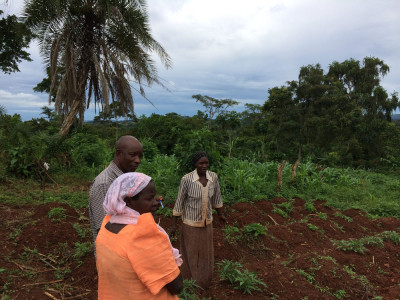This equatorial country has abundant rainfall most of the year and plants benefit from long sunny days. “Almost everything planted in Uganda grows,” laughs Robert Mwanga, CIP sweetpotato breeder known widely for his release of prominent OFSP varieties over the last 30 years.
Mwanga is right. Uganda’s rainfall, sun, and rich soil make it one of the few countries where all crops of the CGIAR Research Program on Roots, Tubers, and Bananas (RTB), which CIP serves as the lead center, thrive. Cassava, sweetpotato, and cooking bananas are regularly on Ugandan tables.
In the Mukono district 40 kilometers from Kampala, Nalongo Sekiguce, opens the door to her screenhouse where she grows three varieties of OFSP. Nalongo leads one of four farmers groups in the district that CIP and extension partner Vedco provide with clean planting materials and extension services. Before entering the screenhouse, Nalongo instructs us how to clean our shoes. Once inside, she shows us the varieties that she grows. She is a vine multiplier who raises sweetpotatoes that are virus-free and then sells the vines to neighbors who grow these improved varieties in kitchen gardens and to sell.
Word has gotten out about Nalongo’s vines. The yields they produce far outstrip other varieties planted and her neighbors demand only the vines that come directly from her screenhouse, which protects them from pests and diseases. She has been a model farmer over the years and she now participates in field trials of new CIP varieties.

At a meeting of several farmer groups from Mukono in the St. Judes Primary School, farmers discuss their successes and challenges in growing sweetpotato. Nalongo’s success in selling vines inspires others to want to do the same. The demand for vines by neighbors and others is high. A program on Farm Radio broadcasted Nalongo’s cell phone number and she was soon swamped with orders that nearly emptied her screenhouse. Others in the meeting worry about drought and the signs of sweetpotato virus disease that they have noticed on some vines. Some still wonder how much more success they could have if they had more tools or more screenhouses. Nalongo wonders out loud how she could export sweetpotato to other regions or countries just as they see apples in their markets imported from other countries in Africa.
The meeting in the schoolhouse ends with dancing and singing. The song they sing with the most enthusiasm is about OFSP and the health benefits it provides. “The orange sweetpotato is the healthy one,” the song goes. “It’s good for the eyes and the body.” They sing because they hope others will take up OFSP but more because they believe in it.
